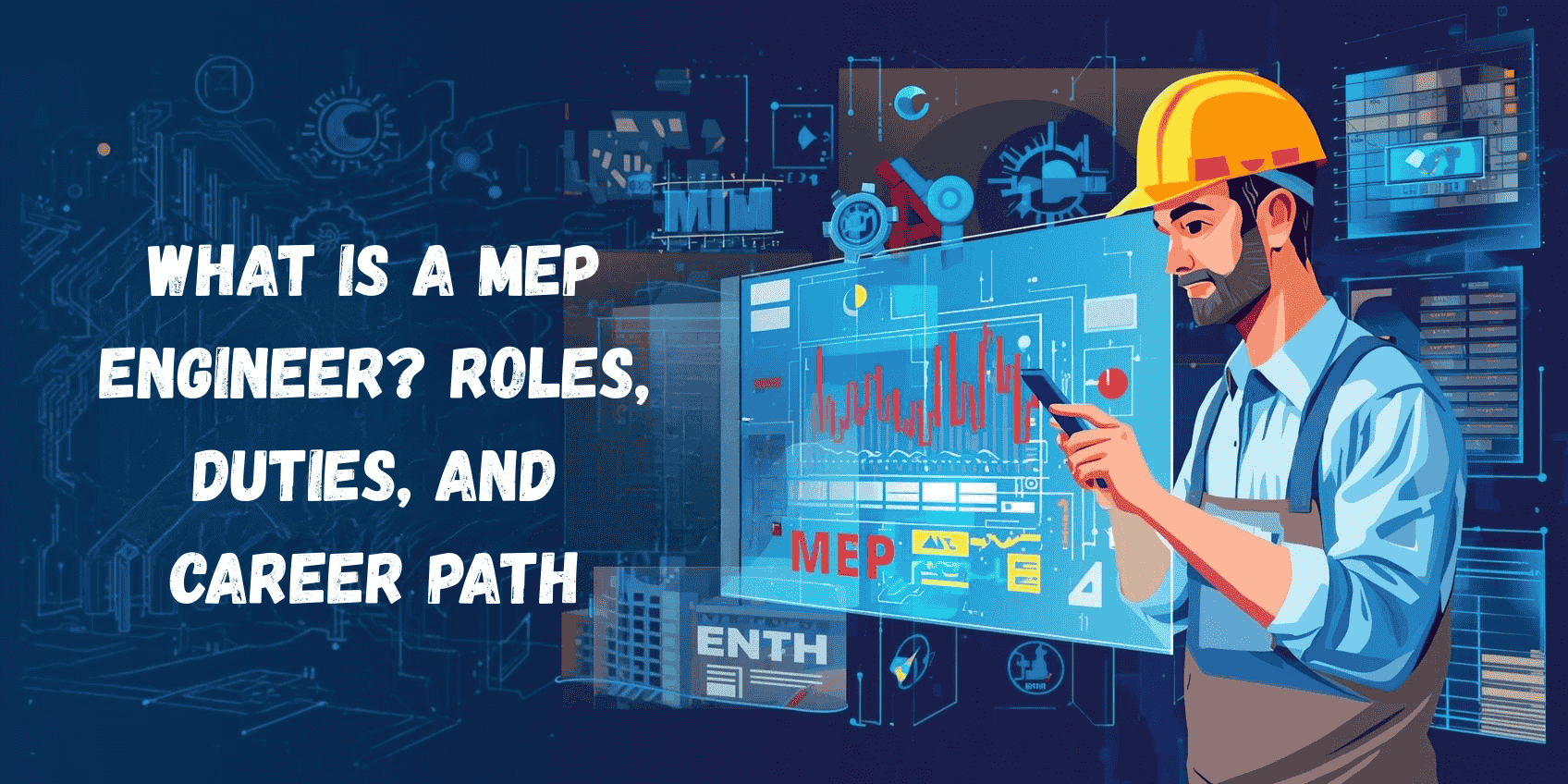
The construction sector is facing increasing pressure as demand for skilled professionals exceeds supply. Projects frequently encounter delays, higher costs, and inconsistent quality due to this imbalance. Addressing the skills shortage in MEP industry is essential to maintain efficiency, optimize workforce planning, and ensure that project timelines and standards are consistently met.
Impact of skills shortage on MEP project delivery is evident as firms struggle to manage complex projects efficiently. Attracting and retaining qualified professionals is increasingly challenging, with the average MEP engineer salary in the USA at $101,752/year. This shortage affects execution, decision-making, and resource allocation, underscoring the need for targeted upskilling and workforce development.
What is the MEP Skills Gap and Why is it a Growing Concern in the Industry?
The MEP skills gap refers to the widening disparity between the demand for qualified MEP professionals and the available workforce. This shortage is a growing concern in the industry because it directly affects project efficiency, quality, and timelines. Rising project complexity and evolving technologies intensify ongoing MEP career challenges and highlight the urgent need for workforce development.
The reason the MEP skills gap is a growing concern:
-
The shortage of experienced engineers and technicians limits the industry’s ability to meet project deadlines and maintain high-quality standards.
-
Limited hands-on exposure to advanced tools and systems leaves professionals unprepared for modern project demands.
-
Low awareness and interest in MEP careers among graduates restricts the inflow of new talent.
-
Rapid adoption of technologies like BIM and energy-efficient systems creates a higher demand for specialized digital and technical skills.
-
Identifying what training is needed to close the MEP skills gap is vital for preparing a workforce that can meet the increasing complexity and demands of modern MEP projects efficiently.
What Factors Are Contributing to the Shortage of Skilled MEP Professionals?

The shortage of skilled MEP professionals stems from several interconnected industry challenges. Increasing project complexity, evolving technologies, and limited access to specialized training have disrupted talent pipelines. Addressing why is the MEP industry facing a skills gap requires understanding how these shifts affect workforce readiness, recruitment consistency, and long-term professional growth across technical and managerial roles.
Key factors behind the shortage:
-
Aging Workforce: A large portion of experienced MEP professionals is approaching retirement, creating a gap that younger engineers are not yet prepared to fill.
-
Limited Technical Training: Many academic and vocational programs lack depth in MEP-focused subjects, reducing the number of graduates equipped for specialized field demands.
-
Low Awareness Among Students: MEP careers often receive less visibility compared to civil or mechanical engineering, leading to fewer entrants pursuing this specialization.
-
Rapid Technology Shifts: The integration of BIM, automation, and energy-efficient systems demands new digital skills that existing workers may not possess.
-
Changing Workforce Dynamics: Fluctuating workloads, global competition, and limited stability continue to influence the future of MEP workforce, making it difficult for firms to attract and retain qualified professionals.
How Does the Skills Gap Affect Project Quality, Cost, and Timelines?
The widening skills gap in the MEP sector can significantly influence the efficiency and predictability of projects. Delays, cost overruns, and quality inconsistencies often stem from a lack of adequately trained personnel. Addressing workforce readiness through targeted MEP skill development is becoming increasingly important to maintain project standards and ensure teams can handle complex, multidisciplinary tasks effectively.
These aspects highlight the impact of the skills gap:
-
Reduced Efficiency: Projects progress more slowly when critical tasks cannot be executed by sufficiently skilled personnel, creating bottlenecks in workflow.
-
Quality Issues: Inadequately trained staff can make errors during design, installation, or commissioning, leading to rework and compromised standards.
-
Extended Timelines: Tasks take longer to complete due to lack of experience, resulting in delayed project milestones and delivery dates.
-
Cost Overruns: Errors, rework, and inefficiencies increase labor and material expenses, pushing project budgets beyond initial estimates.
-
Dependency on External Support: Companies often rely on consultants or temporary specialists to fill gaps, which adds complexity and additional costs.
-
Coordination Challenges: Insufficient expertise hampers effective collaboration among multidisciplinary teams, causing workflow misalignments and further delays.
What Role Can Training, Certifications, and Upskilling Play in Bridging This Gap?
Developing a skilled workforce relies on continuous learning and practical exposure. Training programs help professionals adapt to changing project requirements while maintaining standards. Structured learning supports knowledge retention and efficiency, highlighting how education can bridge the skills gap in MEP industry by preparing employees to handle evolving technologies and complex tasks.
The following demonstrates the impact of training, certifications, and upskilling in addressing the MEP skills gap:
-
Professional development provides employees with up-to-date technical knowledge and a clear understanding of industry standards.
-
Practical experience strengthens expertise, reducing errors and improving project accuracy and quality.
-
Structured career pathways support employee retention and long-term professional growth.
-
Improved team collaboration enables efficient coordination across disciplines and better use of processes and tools.
-
Organizational adaptability allows staff to respond effectively to new technologies and increasingly complex project requirements.
How Does BIM Adoption Highlight the Need for New Skills in MEP Engineering?

The integration of BIM in construction projects has transformed how designs are planned, coordinated, and executed. Engineers now require advanced technical knowledge and digital proficiency to work efficiently in collaborative environments. As systems become more interconnected, understanding data management, model accuracy, and interdisciplinary coordination is essential, highlighting the growing demand for specialized training and expertise in MEP software.
The following illustrates key areas where BIM adoption drives skill requirements:
-
Enhanced modeling accuracy requires engineers to understand complex design coordination and clash detection.
-
Effective collaboration depends on multidisciplinary teams sharing and interpreting detailed digital models.
-
Real-time project updates demand familiarity with integrated systems and version control protocols.
-
Data management skills are essential for handling large project files and ensuring model integrity.
-
Proficiency in BIM for MEP engineers allows professionals to contribute efficiently to design, analysis, and installation workflows.
-
Continuous learning is necessary to stay current with evolving BIM tools, standards, and industry practices.
Conclusion
Addressing the MEP skills gap requires strategic focus on workforce development, practical exposure, and ongoing professional learning. Strengthening MEP education and skills ensures engineers are prepared for evolving technologies, complex project requirements, and collaborative work environments. Organizations that invest in structured training, certifications, and targeted upskilling can enhance efficiency, reduce errors, and maintain consistent project standards across diverse teams.
Opportunities such as the BIM Course for MEP Engineers, offered by Novatr, provide structured learning to bridge expertise gaps. For additional insights, visit our resource page to explore guidance, training pathways, and industry best practices. Building a capable workforce through education and skill development is essential to meet current and future project demands effectively.
FAQs
1. How is the MEP skills gap different from general construction workforce shortages?
Ans: The MEP skills gap focuses on specialized technical knowledge in mechanical, electrical, and plumbing systems, unlike broader construction workforce shortages.
2. What impact does the skills gap have on project costs and quality?
Ans: A lack of skilled MEP professionals can lead to design errors, rework, and delays. This increases labor and material costs while potentially lowering overall project quality and efficiency.
3. Which MEP disciplines (mechanical, electrical, plumbing) face the biggest gaps?
Ans: Mechanical and electrical disciplines experience the largest shortages due to complex system demands and advanced technical requirements. Plumbing also faces gaps but is comparatively less affected in most regions.
Was this content helpful to you



.jpg)



